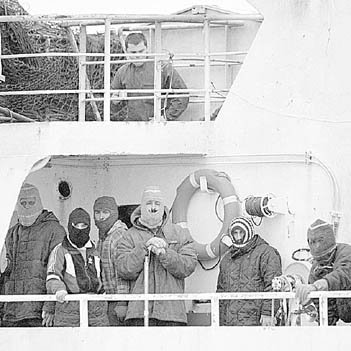|
The coastal regions are dotted with sandy beaches alternating with steep rocky bluffs. Many of its rivers empty directly into the Atlantic Ocean. Brightly painted canoes can be seen in lagoons, rivers, bays and ocean. Agriculture and fishing represents 55% of the economy. The fishing communities are homes to fishing families that have plied the waters for generations.
Sounds like the coast of Maine? But it's not. It's the Republic of Ghana situated along the Atlantic Ocean on the west coast of the African continent and it's known as the Gold Coast of Africa.
In those coastal areas, not much has changed for generations. Even today, 76% of the fishing fleet is artisanal. Motored boats are a new addition to the domestic fishing fleet. It has provided them access to new fishing grounds where they fish for tuna amongst other species.
But looming over the horizon is what the fishing communities in many parts of the world are already familiar with: news and stories about declining fish stocks off Ghana's coastline. And the culprits seem to be a fleet of pirate boats with great physical and fiscal mobility roaming the world's oceans for fish.These pirate longliners - ships that use long lines with
thousands of baited hooks - are looking for tuna, but due to
|

"We don't need no stinkin' permits." The crew of the Belize
flagged,
Spanish owned pirate vessel Salver found fishing illegally for
Chilean
Sea Bass by Greenpeace in the Southern Ocean in 1999.
©
Greenpeace/Newman.
|
|
the often-indiscriminate nature of their practices, end up hooking other valuable fish such as swordfish and marlin as well as sharks, turtles, and other marine animals. Pirate longliners operating in the Southern regions dives for the baited hooks.
Critics believe that pirate fishing undermines current efforts in
|
place to avoid overfishing, rebuild stocks, and maintain healthy populations of marine animals. The pirate ships seem to be aided in their actions by loopholes in international laws that allow ships to register in and fly the flags of countries that are not party to agreed upon treaties or have no interest in enforcing
continue
|
|

